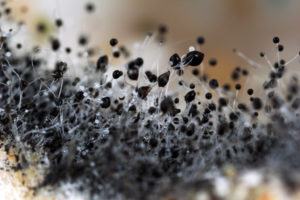June 25, 2015 | Black & Kletz Allergy
 Allergic Fungal Sinusitis (AFS) is a chronic inflammatory condition involving the nose and sinuses caused by an allergic sensitivity to environmental fungi. It is usually seen in people with normal immune systems as opposed to invasive fungal infections which usually affect people with compromised immune systems caused by conditions which may include diabetes mellitus, certain cancers, HIV infection, and patients receiving chemotherapy or radiation treatment. It is similar to a condition that affects the lung called Allergic Bronchopulmonary Aspergillosis (ABPA).
Allergic Fungal Sinusitis (AFS) is a chronic inflammatory condition involving the nose and sinuses caused by an allergic sensitivity to environmental fungi. It is usually seen in people with normal immune systems as opposed to invasive fungal infections which usually affect people with compromised immune systems caused by conditions which may include diabetes mellitus, certain cancers, HIV infection, and patients receiving chemotherapy or radiation treatment. It is similar to a condition that affects the lung called Allergic Bronchopulmonary Aspergillosis (ABPA).
Many patients with AFS are atopic, meaning they have a tendency to develop allergic sensitization when exposed to common harmless substances like pollens, dust mites, cats, dogs, and certain foods. About two-thirds of patients with AFS also have allergic rhinitis and up to half of them also have allergic asthma. AFS is most commonly seen in young adults with an average age of 22 years.
CAUSE:
When an atopic person breathes in air containing the fungus, it triggers an allergic inflammation of the mucus lining inside the nostrils and sinuses resulting in swelling of the tissues. This swelling leads to blockage of the sinus drainage pathways causing the mucus secretions (mucin) to accumulate within the sinus cavities. This, in turn, creates an ideal environment for further reproduction of the fungus. The sinuses are eventually filled with a viscous and tenacious fungal mucin which has the consistency and appearance of peanut butter.
SYMPTOMS:
- Nasal congestion
- Discolored copious nasal secretions
- Semi-solid nasal crusts
- Polyp formation in the nose and the sinuses
- Post-nasal drip
- Throat irritation
- Occasional headache or facial pressure
- Decreased sense of smell
In advanced stages, facial disfigurement and vision disturbances may also be encountered due to extension of the disease to the surrounding areas.
DIAGNOSIS:
- Total IgE antibody levels in the blood will be elevated several times the normal limits.
- Skin testing to various fungal organisms.
- CT scan of the sinuses can demonstrate accumulated fungal mucin in the sinus cavities.
- Mucin drained from the sinuses needs to be examined for specific histological characteristics under the microscope and cultured in the laboratory to identify the specific type of fungus.
TREATMENT:
- Fungal mucin in the sinuses needs to be drained out by endoscopic sinus surgery.
- Systemic and topical steroid medications to reduce the inflammatory changes and shrink the polyps.
- Environmental control to reduce the exposure to the fungi and molds.
- Systemic or topical antifungal medications may be used to reduce the amount of fungus.
- Allergy immunotherapy (allergy shots) with the antigens identified by skin testing to develop tolerance to the fungal allergens and to control the chronic inflammatory reactions.
A comprehensive management plan incorporating medical, surgical, and immunologic care remains the most likely means of providing long-term disease control for allergic fungal sinusitis (AFS).
The board certified allergists at Black & Kletz Allergy in the Washington, DC, Northern Virginia, and Maryland metropolitan area have been treating sinus disease for more than 5 decades. We have expertise in recognizing and managing individuals with allergic fungal sinusitis. Black & Kletz Allergy has 3 convenient locations in the Washington, DC area with offices in Washington, DC, McLean, VA (Tysons Corner, VA), and Manassas, VA. We have on-site parking at each location. In addition, the Washington, DC and McLean, VA offices are accessible by the Metro. If you suffer from any of the above symptoms, please contact one of our offices to make an appointment. Alternatively, you can click Request an Appointment and we will contact you within 24 hours of the next business day. We strive to serve the community in a professional, friendly, and caring manner.












